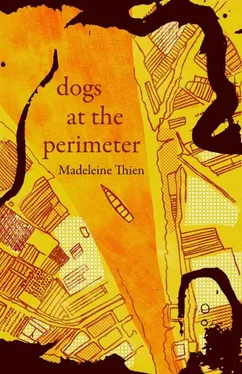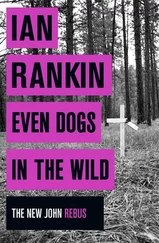All mortal things are impermanent, their nature is to arise and decay, having arisen they cease, in their stilling is happiness .
I opened the door to our apartment but nothing was visible. All the walls had been folded away.
“Tell me a story,” my father said, his voice disembodied and sad. “My thoughts are dissolving. Don’t turn away,” he begged. “I was walking, the sky goes forever. Why is it changing to dust?”
I caressed his hands, I forced the pills between his lips.
—
The next morning, our mother could not stand. When Prasith came, we tried to tell him that she was ill and couldn’t work, but the teenager just watched us with a faint smile on his lips. Kosal, he said importantly, had granted us permission to take our mother to an infirmary.
Prasith raised our mother up from the floor and carried her out of the hut. Her eyes flickered open and she tried to nudge him away. “Don’t worry,” he said. “Your children are here.” Carefully, almost tenderly, he lay her inside a wooden cart. My brother and I took hold of opposite handles and began to push. Prasith led us away from the cooperative, his face tilted toward the clouds, as if luxuriating in the rising warmth. When our path joined another road, he gave us further directions and turned back.
“That boy,” my mother mumbled, barely conscious. “I know that boy.”
Nothing seemed real. The road we walked on was desolate and cratered and the sun never seemed to move, only to come steadily nearer, expanding into a dense fog. Twice, Khmer Rouge soldiers stopped us. They examined the permission slips Prasith had given us and then they waved us on, past workers who dissolved into the mist, past grey animals. Hours later, we arrived at the infirmary, a ruined concrete building where the nurses were only children and the sick lay everywhere on cots on the ground.
Upstairs, we found a place for our mother. There was no medical equipment but nurses came around with medicine, small white cubes that they stirred into bowls of water. Our mother was more alert now. She drank the medicine, her hands shaking, the water spilling. When the bowl was empty, she smiled weakly at us.
“Sugar,” she said. “It’s sugar.”
Heavy rains began, lightning bursts, flooding. Hurriedly, we unrolled the bamboo blinds that clung to the ceiling. They were tattered and the wind swung them back and forth. We sat close to our mother, trying to keep her warm. I watched as she stared feverishly into my brother’s face, looking for something, a detail beloved to her, a trace of someone I couldn’t see. Sopham’s eyes were like still ponds. I leaned my head against the wall, unable to rest.
Often, my father had gone away. He would return home, to Norodom Boulevard, with empty pockets and bloodshot eyes, he would say things like, “I got carried away. I started walking up Monivong and suddenly it was Tuesday but how that happened, I don’t know.”
“We don’t know,” my brother and I would echo. “We don’t know!”
“All I remember,” my father said once, his hands drifting limply in the air, “is looking up at the sky and thinking the sky would never go dark, it can’t get dark because a hard blue lid covers everything. ‘Whatever else we were intended to do, we are not intended to succeed,’ who said that? A great man. A great, good man. We are not. We are not …”
For as long as I could remember, my father treated his sadness with Valium, pills he had begun taking when he was a student in Phnom Penh. I used to buy his medicine for him, by the cupful, in the Chinese market. But later, as the war dragged on, when the Khmer Rouge controlled the Mekong River and everyday the airport came under worse bombardment, the market ran out of pills. My father stopped sleeping, ate little, and worried constantly. The rockets and mortar fire cracked his nerves and sometimes his eyes seemed strange and elongated to me, bloodshot, red-rimmed, and lost. He wrote lists of names, people he could appeal to for money or support, people who could transport us to the border. He tucked the lists into my clothes for safekeeping.
One night, my mother set empty plates on the dinner table and looked searchingly at us, at him.
He ran his index finger across a plate, as if to check for dust.
“Would you like to go out?” he asked, flustered. His long body stooped toward her, like a fishing rod. I yearned to go to him, to pull him back. Our mother was not like other mothers, she had never been shy or decorous or restrained.
“Into the city?” my mother said, dropping her voice. “So we can dine with all these military men waiting for what, the end of the world? And the cost of rice, don’t you realize? it’s up again and your wallet’s empty. There’s nothing here and tomorrow will be the same.”
My brother watched, bright with embarrassment.
“Shhh,” my father said, smiling weakly, eyes drifting to the window where voices rose like applause and touched the curtains, then dissipated back into the street below.
“Promise me, my love. We must get out. The war is ending but what does it mean?”
“I don’t know. I’ll get us out.”
“At least Sopham,” my mother said.
“I promise.”
Downstairs, I saw people lying in streams of water, their mouths open, the rain leaking in. The floor was littered with bodies, and I couldn’t differentiate the dying from the dead. There was no help for them. I hid upstairs, beside Sopham, unable to speak. Between us, the quiet had become habitual, we were wary of the spies and the chhlop , of saying the wrong thing. In Kosal’s cooperative, a teenager named Milia had been caught keeping a diary. When the spies found it, Milia had disappeared. She never came back and I lay awake at night, staring at the place she used to sleep. It was occupied by another girl, as if Milia had never been. The diary, too, with all its thoughts and secrets, had been swallowed up. I dreamed they were under the huts, Milia, the banker, reaching their arms up, trying to help us.
The torrential rains stopped. One of the nurses saw that my mother was stronger, and we were discharged.
Walking home, my brother and I took turns pushing the empty cart, our mother beside us, her steps tentative and weary. The sky was translucent, a watery gold that settled like steam over the distant fields. “Everything ends,” my mother said. “But we’re here. We’re together, even if all else must fade away.”
Prasith came to us. In our small patch of vegetables, he said, “Who owns all this?”
“Come and see,” he said, calling the other children. “Whose food is this?”
I told him that this garden was ours.
Prasith got down on his hands and knees and began digging at the dirt. He snuck his fingers deep into a hole and extracted the tiny, misshapen root, a sweet potato, the earth still clinging to its wrinkled skin. “You don’t understand,” he said. “Not yet. But you will: we no longer steal from the people.”
“I won’t,” I said.
“Steal,” he whispered.
He put the tiny root in my hand.
Devotion softened his face. He said that people had suffered, they had given their lives to end this injustice. “That’s why we fought this war,” he said, “so that all of us might be free.” He picked up a shovel that was lying nearby and began to dig, bringing up the roots and all the food. “I caught a boy stealing,” Prasith said. “He took a watermelon but I punished him. Would you like to know how?”
The dry grass bit my feet. His voice suffocated me but I tried to close my ears, to cloak myself. Prasith stepped nearer, the words flowing out of him as if they were music.
“How brave you are,” Sopham said, cutting him off. “You must be fearless to do a thing like that.”
Читать дальше












